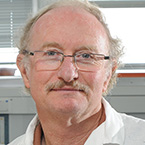
For his pivotal research involving the cloning of the gene that encodes p53, and for his landmark biochemical and biological discoveries that have revealed the basis for the ability of p53 to act as a tumor suppressor, as well as the consequences of p53 inactivation in cancer.
A pioneer in the field of cancer biology, Dr. Oren is recognized for his seminal contributions to the identification and understanding of the tumor suppressor p53, whose malfunction is widely accepted to be at the root of tumor initiation and development for nearly half of all cancers. He is credited with cloning the gene that encodes p53, an accomplishment that would lay the foundation for innumerable subsequent research endeavors. Initially thought of as an oncogene with transformative properties, it was later realized that only mutant p53 clones gave rise to proliferative phenotypes, while non-mutated, wild-type p53 actually inhibits cancer cell proliferation. Dr. Oren demonstrated in a series of high impact publications that p53 regulates programmed cell death, firmly establishing the role of p53 as a tumor suppressor. He observed a significant reduction in the number of transformed foci when wildtype copies of p53 plasmids were introduced into rat embryo fibroblasts. Incorporation of mutant p53 plasmids led to the opposite effect, observing at times increased numbers of foci. In addition, using murine myeloid leukemia cells that lacked p53, his research group observed that introduction of wild type copies of p53 led to loss of cell viability through apoptosis, now recognized as a hallmark p53 function.
He is recognized for making several landmark discoveries that continued to reveal the various functions of p53 and its regulation. His research group discovered that Mdm2 regulates p53 activity in normal cells, critical for the homeostasis of p53 levels. Overexpression of Mdm2 leads to the loss of p53 activation while also promoting the degradation of p53. His ongoing research continues to focus on determining the biochemical and biological basis for the ability of p53 to act as a tumor suppressor, as well as the consequences of p53 inactivation in cancer.
Career Highlights
2019 Elected Foreign Associate, National Academy of Sciences
2013 Elected Foreign Associate, National Academy of Medicine
2009 Elected Fellow, European Academy of Cancer Sciences
2008 Israel Prize for Biochemistry
2007 Elected Member, Academia Europaea, London, United Kingdom
2007 Elected, International Honorary Member, American Academy of Arts and Sciences
2006 Elected Member, Israel National Academy of Sciences and Humanities, Jerusalem, Israel
2003 MERIT Award, National Institutes of Health
2003 EMET Prize, Life Sciences
2002 Lambroso Award for Cancer Research, The Weizmann Institute of Science
1999 Abisch-Frenkel Prize for Excellence in Life Sciences, Abisch-Frenkel Foundation for the Promotion of Life Sciences, Basel, Switzerland
1988 Eleanor Roosevelt International Cancer Fellowship, American Cancer Society
1986 Morris L. Levinson Prize in Biology, Mathematics and Physics, The Weizmann Institute of Science, Rehovot, Israel